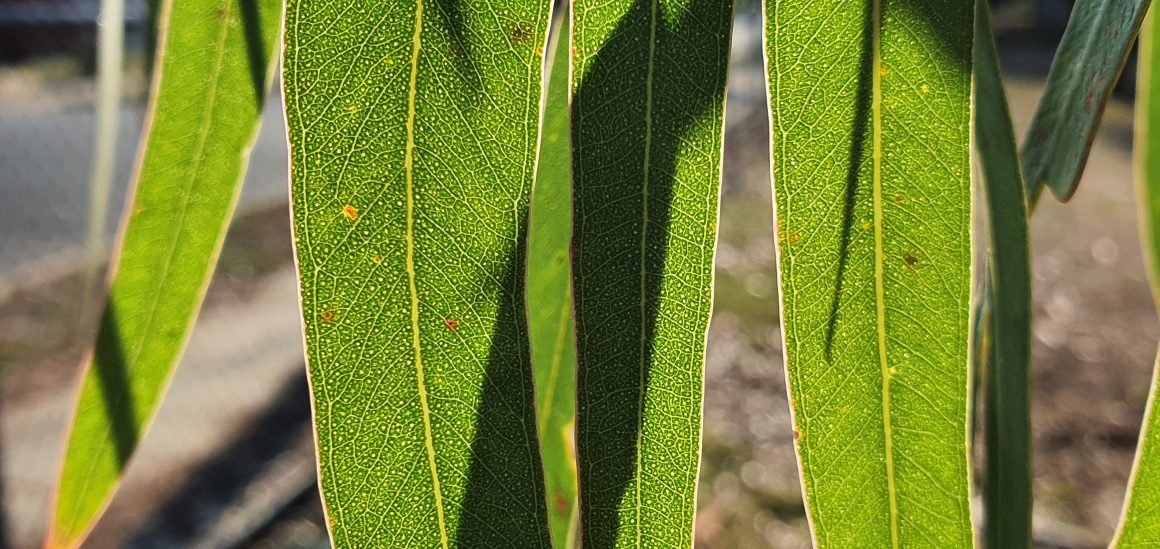A walk in the bush
If you are fortunate, as you are walking along a bush track somewhere in Australia, your senses will quite suddenly be overpowered by the amazing aroma of Eucalyptus oil. You might feel as if you have entered a sacred space, that the air feels heavier, but your breath comes easily. You might pick a leaf if some are hanging low enough — but whilst you might crush it and sniff it, do not be tempted to chew it!

Eucalyptus trees are members of the huge plant family known as Myrtaceae. Some other notable plant groups in this family include myrtle, clove, peppermint and allspice. All species in this family share the characteristics of being woody plants containing essential oils. The strong aroma of Eucalyptus oil seems to be an evolutionary adaptation to prevent the leaves from being eaten by herbivores. Indeed, of larger animals, only marsupials are tolerant enough to consume the high oil levels in the leaves, with koalas and possums being the most tolerant. Nevertheless, the trees are still subject to attack by many insect pests.

The benefits of Eucalyptus oil have been felt far and wide in our everyday lives. Most of us will be aware of Eucalyptus oil being used for cleaning, as an antiseptic and as a decongestant. Very low quantities are used in consumer products such as cough drops, toothpaste and in common decongestants such as Vicks VapoRub, where it comprises just 1.32%. It is mainly used as an inhalant or for absorption through skin. Oral consumption of the undiluted oil can be lethal, especially to children.
History and progression
Eucalyptus oil infusions were used by Indigenous Australians long before white settlers arrived in the country. They used these infusions for sinus infections, congestion, fever, and colds as well as for body pains. In 1852, Bosisto, a brand still active in Australia today, set up the first commercial production facilities near the Dandenong Ranges.

Although it has been used worldwide for over a century, recent health research suggests that many of the powers of Eucalyptus oil are yet to be unleashed.
Research on the medical properties of Eucalyptus oil in the past decade or so has been quite extensive, and has uncovered some exciting preliminary findings that invite further study. I will summarise some of the key findings of the research so far, which show that Eucalyptus oil may indeed deserve a prominent place in our medicine cabinets.
Antibacterial and antifungal properties
Eucalyptus oil has the remarkable ability to kill or inhibit many different bacteria including TB (Mycobacterium tuberculosis) and the bacteria known as the ‘MRSA Superbug’ (methicillin-resistant Staphylococcus aureus, or Golden Staph) which currently causes huge cross-infection problems in hospitals here in Australia.
Eucalyptus oil has also been shown to be an effective antifungal, with potential to act against many fungi including Candida: a strain of yeast that causes some common infections such as athlete’s foot and thrush. Although there are other antifungals that can act against many of the same infections, increasing resistance to current treatments means that new alternatives may soon be needed.

Powerful against the Flu, COVID-19 and other viruses
This remarkable oil can also stop some viruses in their tracks! An emulsion formulated from Eucalyptus leaf extract has been shown to inhibit influenza viruses in vitro (i.e. in lab experiments not involving living organisms). An oil-in-water emulsion with Eucalyptus leaf extract was found to completely stop virus replication. Since influenza is mostly transmitted through aerosol droplets, an emulsion of this kind has promising potential to prevent this kind of transmission, for instance if pumped into the air of a train carriage or childcare centre.
A very recent paper published in 2021 showed Eucalyptus oil to be highly effective against key enzymes of the SARS-CoV-2 virus that causes COVID-19. Although this is early research and much more work will be needed to determine whether this can be used to develop an effective medicine, it is good news for the medicinal potential of Eucalyptus oil.
Benefits for allergies and the immune system
In addition to its broad-spectrum antimicrobial effects, even more remarkably, Eucalyptus oil also stimulates the immune system at the same time. It stimulates the activity of white blood cells to target and destroy harmful disease-causing particles.
And while it stimulates some areas of the immune system, Eucalyptus oil soothes several other areas. It reduces inflammation, acts as both an antioxidant and an analgesic (pain-reliever) and reduces muscle spasms. It has been shown to have specific benefits in the treatment of allergic skin reactions, which have been increasing in incidence worldwide. It seems likely that further research will find that extracts of Eucalyptus oil will soon be able to be used on other severe allergic conditions caused by mast cells (a type of white blood cell involved in allergic reactions).

Will the world smell more of Ecualyptus oil?
I love the beautiful natural scent of Eucalyptus emanating from a canopy of trees, but most of our modern lives are not spent under such canopies. Excitingly, there is growing evidence that we might be able to significantly reduce disease transmission with Eucalyptus oil. I wonder whether we might soon find it added to air conditioning systems in public buildings and in public transport?
In a post-COVID world, where the world is now aware of how easily viruses are transferred by droplets in air, might pumped Eucalyptus oil be just the new public health innovation we need?
References
Sadlon AE & Lamson DW (2010) Immune-modifying and antimicrobial effects of Eucalyptus Oil and simple Inhalation Devices. Alternative Medicine Review 15 (1) 33-47
Sadatrasul MS et al (2017) Oil-in-water emulsion formulated with eucalyptus leaves extract inhibit influenza virus binding and replication in vitro. AIMS Microbiology 3 (4) 899-907
Gowrishankar S et al (2021) Promising phytochemicals of traditional Indian herbal steam therapy to combat COVID-19. Food Chem Toxicol 148: 111966 doi: 10.1016/j.fet.2020.11966
Nakamura T et al (2020) Eucalyptus Oil reduces allergic reactions and suppresses mast cell degranulation by downregulating IgE-FceRI signalling. Nature Research https://doi.org/10:1038/441598-020-77039-S (15 pages)
This article was supported by Eucalypt Australia.

Banner image courtesy of Cathy Cavallo.


Leave a Reply